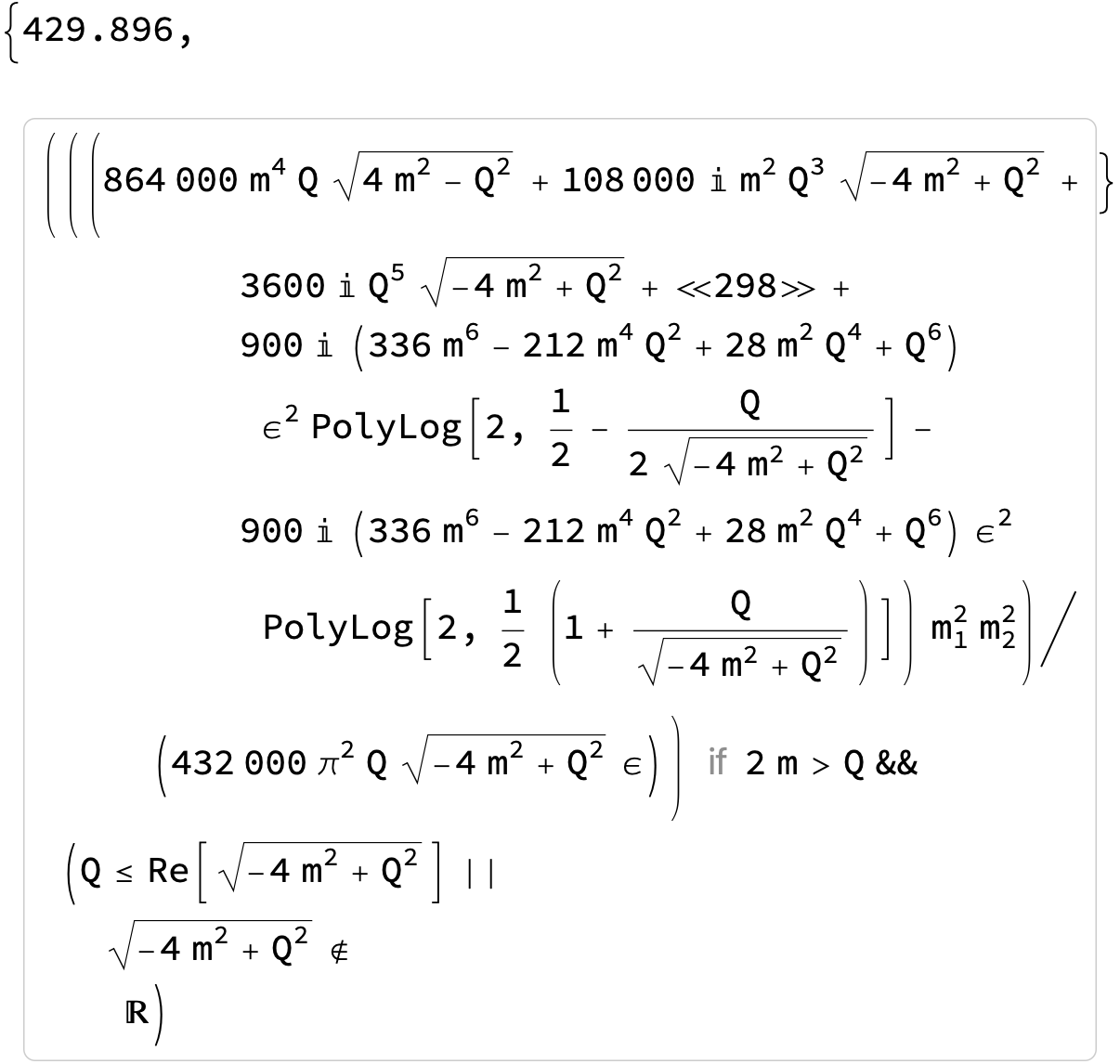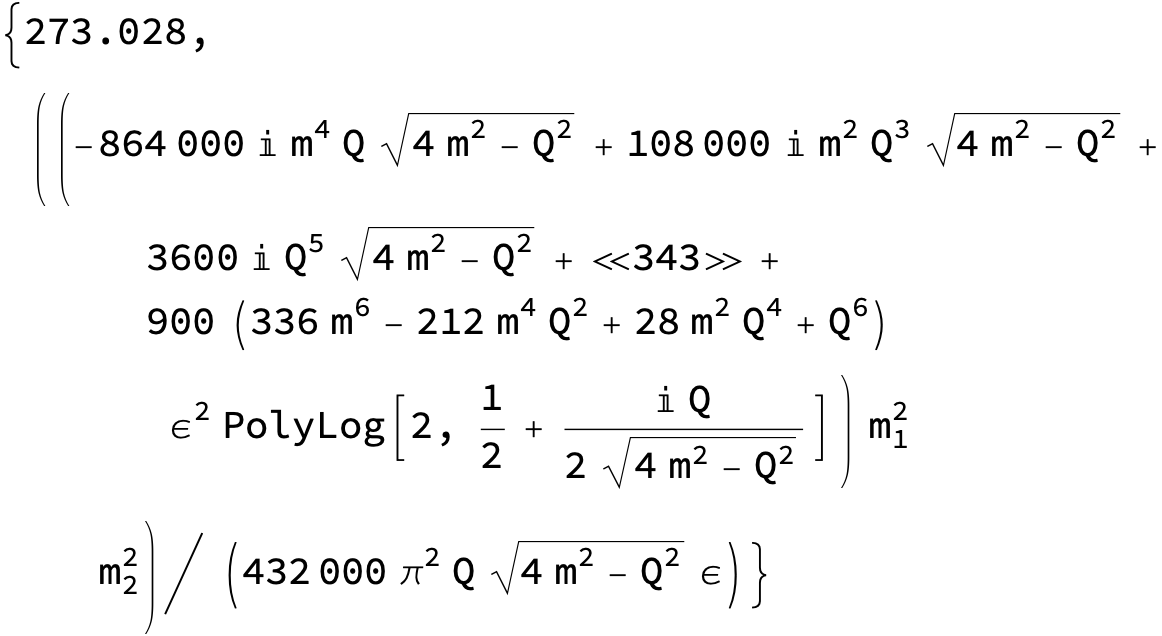I am having trouble performing the following integration which comes from a larger function (let me know if I inputted the code wrong from Mathematica so I can fix it!) and even with assumptions, Mathematica just gives back the original line of code. Any suggestions on how to help Mathematica evaluate this I would be grateful, thanks! (I can also post in Latex what the integral looks like if that may help anyone).
(Note: I do need/want the symbolic version of this and not a numerical form, so I haven't tried NIntegrate[] yet. I am particularly interested in the behavior of the Q's and m's (specifically ln(-Q^2/m^2) and how that behaves. This is the final step in a computation from QFT if anyone was wondering).
Integrate[SeriesData[\[Epsilon], 0, {Complex[0,
Rational[1, 4]] Pi^(-2) (
2 m^4 - 4 m^2 (m^2 - Q^2 (1 - x) x) - (m^2 - Q^2 (1 - x) x) (
6 (m^2 - Q^2 (1 - x) x) + Q^2 (5 - 12 x + 8 x^2)))
Subscript[m, 1]^2 Subscript[m, 2]^2, Complex[0,
Rational[1, 16]]
Pi^(-2) ((-8)
m^4 + m^2 ((-8) Q^2 (-1 + x) x + 20 (m^2 - Q^2 (1 - x) x)) + (
m^2 - Q^2 (1 - x) x) (
14 (m^2 - Q^2 (1 - x) x) + Q^2 (
15 - 36 x + 20 x^2)) + Rational[-1, 4] (m^2 - Q^2 (1 - x) x) (
16 m^2 + 4 Q^2 (5 - 12 x + 8 x^2)) (
1 - 2 EulerGamma + Log[
16] + 2 Log[Pi] + 2 Log[(m^2 - Q^2 (1 - x) x)^(-1)]) - 4 (
m^2 - Q^2 (1 - x) x)^2 (
2 - 3 EulerGamma + Log[
64] + 3 Log[Pi] + 3 Log[(m^2 - Q^2 (1 - x) x)^(-1)]) - 4 m^4 (
EulerGamma - Log[4 Pi/(m^2 - Q^2 (1 - x) x)]))
Subscript[m, 1]^2 Subscript[m, 2]^2, Complex[0,
Rational[1, 384]]
Pi^(-2) ((-220) (m^2 - Q^2 (1 - x) x)^2 + 48 (
m^2 + Q^2 (-1 + x) x)^2 - 6 (m^2 - Q^2 (1 - x) x) (
28 m^2 + Q^2 (17 - 60 x + 44 x^2)) - 6 (m^2 - Q^2 (1 - x) x) (
20 m^2 + Q^2 (15 - 36 x + 20 x^2)) (-1 + 2 EulerGamma - Log[
16] - 2 Log[
Pi] - 2 Log[(m^2 - Q^2 (1 - x) x)^(-1)]) + 56 (
m^2 - Q^2 (1 - x) x)^2 (
2 - 3 EulerGamma + Log[
64] + 3 Log[
Pi] + 3 Log[(m^2 - Q^2 (1 - x) x)^(-1)]) + Rational[1, 2] (
m^2 - Q^2 (1 - x) x) ((-16) m^2 - 4 Q^2 (5 - 12 x + 8 x^2)) (
6 + 6 EulerGamma^2 + Pi^2 + 24 Log[2]^2 + Log[
4096] + 6 Log[Pi] + 24 Log[2] Log[
Pi] + 6 Log[Pi]^2 - 6 EulerGamma (
1 + Log[16] + 2 Log[Pi]) + 6 (
1 - 2 EulerGamma + Log[16] + 2 Log[Pi])
Log[(m^2 - Q^2 (1 - x) x)^(-1)] + 6 Log[(
m^2 - Q^2 (1 - x) x)^(-1)]^2) - 12 (m^2 - Q^2 (1 - x) x)^2 (
8 + 6 EulerGamma^2 + Pi^2 + 16 Log[2] + 24 Log[2]^2 + 8 Log[
Pi] + 24 Log[2] Log[Pi] + 6 Log[Pi]^2 - 4 EulerGamma (
2 + Log[64] + 3 Log[Pi]) + 4 (
2 - 3 EulerGamma + Log[64] + 3 Log[Pi])
Log[(m^2 - Q^2 (1 - x) x)^(-1)] + 6 Log[(
m^2 - Q^2 (1 - x) x)^(-1)]^2) + 4 m^4 (
6 EulerGamma^2 + Pi^2 + 24 Log[2]^2 + 24 Log[2] Log[
Pi] + 6 Log[Pi]^2 - 12 EulerGamma Log[4 Pi] - 12 (
EulerGamma - Log[4 Pi])
Log[(m^2 - Q^2 (1 - x)
x)^(-1)] + 6 Log[(m^2 - Q^2 (1 - x) x)^(-1)]^2) + 96 m^2 (
m^2 + Q^2 (-1 + x) x) (EulerGamma - Log[
4 Pi/(m^2 - Q^2 (1 - x) x)]))
Subscript[m, 1]^2 Subscript[m, 2]^2}, -1, 2, 1], {x, 0, 1},
Assumptions ->
m > 0 \[And] Q > 0 \[And] \[Epsilon] > 0 \[And]
m \[Element] Reals \[And] Q \[Element] Reals]



m^2 - Q^2 (1 - x) xis ever zero in the integration interval. Supplying conditions that ensure that it is not might help. $\endgroup$0<x<1 => 0<(1-x)x<1/4, I think thatm>Q/2>0could be a suitable condition. $\endgroup$